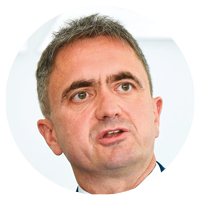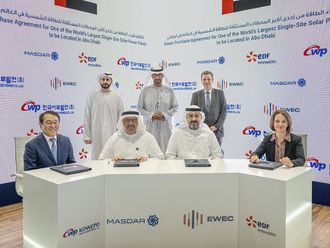Dubai: MAN Diesel & Turbo, a German multinational that produces engines and turbo machinery, has said it is increasingly active in Iran, seeing the country as its biggest growth market in the region.
“We are very active in Iran. We’ve restarted our company there, called MAN Iran Power. We are now building a workshop there, I just signed a lease on the shed,” said Gaby B. Hanna, vice-president and head of region MEA (Middle East and Africa), MAN Diesel & Turbo.
A shed refers to a place where engines or turbines are designed and tested.
Part of the Volkswagen Group, which is set to start exporting cars to Iran this month after 17 years away from the country, MAN Diesel & Turbo is ensuring that it is fully compliant with all regulations when dealing with the republic.
“We see Iran, putting aside all the political issues, as a big market for us,” said Hanna, adding: “The biggest growth market for us.”
Commenting on the lack of investment in Iran, Uwe Lauber, CEO of MAN Diesel & Turbo, noted that the country was a very important market before sanctions were placed on it.
- Dr Uwe Lauber, CEO, MAN Diesel & Turbo
However, due to the freeze on business dealing with Iran, the country had been forced to turn to China and South Korea.
“Over the last couple of years, nothing has been invested. And of course, during the sanctions, we were not able to serve our customers … and to keep plants operating, the Chinese and Koreans were there,” Lauber said.
Slow pace
Hanna added that whilst the opportunity was definitely present in Iran, compliance was significantly slowing the pace of business.
“Until they have their banking sector sorted out, there will still be difficulties,” he added.
Lauber echoed that the biggest issue was finance, and receiving money from Iran in a compliant way.
In recent years, MAN Diesel & Turbo has been trying to capitalise on the move towards renewables and clean energy across the Gulf region.
The UAE announced in January 2017 that it would attempt to balance energy production and consumption by 2050, while investing Dh600 billion to meet demands for energy and ensuring the sustainable growth in the country’s economy.
The energy equation targeted by the UAE’s Energy Plan for 2050 is as follows: 44 per cent clean energy, 38 per cent gas, 12 per cent clean coal and 6 per cent nuclear.
“In the past we’ve only provided fuel engines,” Lauber said, adding: “Now the future is providing hybrid solutions — solar, wind, and then fuel engines.”
Renewables
The Middle East is a latecomer to the renewable energy party. However, for multinationals like MAN, that spells opportunity.
“To have a 44 per cent share of renewables, the UAE needs de-centralised power plants — the grid isn’t enough,” Lauber said.
The senior executive is not discounting traditional fuels just yet, though.
“We will continue our bread and butter line, selling heavy fuel engines, but we must remove the dirty elements in them, such as the sulphur, the nitrogen oxides, and so on. We need to make them clean,” he said.
But the move away from being a simple component supplier, to a fully integrated systems provider, has already begun.
And with over two thirds of the world’s oil and gas reserves in the region, and a number of ageing fleets, the Middle East remains a growth market for MAN Diesel & Turbo, outstripping the likes of Europe and the US.













